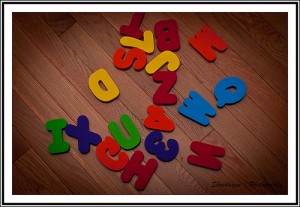Breaking Writer’s Block with Your ABCs (Yes, Really)
 Everyone faces it. The blank page (or blank screen, as the case may be). No matter how carefully we plan and outline, eventually we all have a moment when we just don’t know what to write next.
Everyone faces it. The blank page (or blank screen, as the case may be). No matter how carefully we plan and outline, eventually we all have a moment when we just don’t know what to write next.
Or maybe it doesn’t happen during your first draft. In addition to writer’s block, you can get outliner’s block (“I don’t know what points to cover.”) or reviser’s block (“I know this sentence is off, but I don’t know how to reword it.”). Whatever kind of block you’re facing, you can chip away at it as long as you know your ABCs.
Step One
Write out the alphabet on a piece of paper, one letter per line, on the left side of the page. It’ll look like this:
A
B
C
D…
Step Two
Try to come up with something (either something to say next, a point or topic, or a replacement sentence or phrase) beginning with each letter.
Does it sound impossible? Well, it probably is. You probably won’t come up with something for every letter, but because you’re focusing on letters, not your problem, you’ll come up with a lot more than you might think. For some letters, you might have more than one entry.
For example, say you were trying to generate ideas for an essay about ways to help the environment in your everyday life. Your list might start out something like this:
A
B Batteries—rechargeable, Bikes
C Cans can be recycled, Compost heaps
D Drive less, walk/bike more
E Electricity—ways to reduce use
F Florescent light bulbs
G
See, this hypothetical writer didn’t have anything for A or G (but maybe you can think of some). Also, though some ideas are broad and others are more specific, we can see hints of the essay to come. Perhaps the writer might divide the essay into ways to use less resources (ideas like florescent light bulbs and walking/biking more) and ways to conserve resources that have already been used (ideas like composting and recycling cans).
Now, I can’t take credit for this trick. It’s one I know a lot of writing tutors and teachers use. It’s so helpful because it takes advantage of a commonly understood principle of fostering creativity. When you can do anything, coming up with ideas is hard, but once you give yourself constraints (like “must start with the letter A”), it’s much easier to generate ideas. So the next time you’re blocked, in writing or in any idea-generating activity, just say your ABCs.
Photo Credit: Shardayyy, Creative Commons